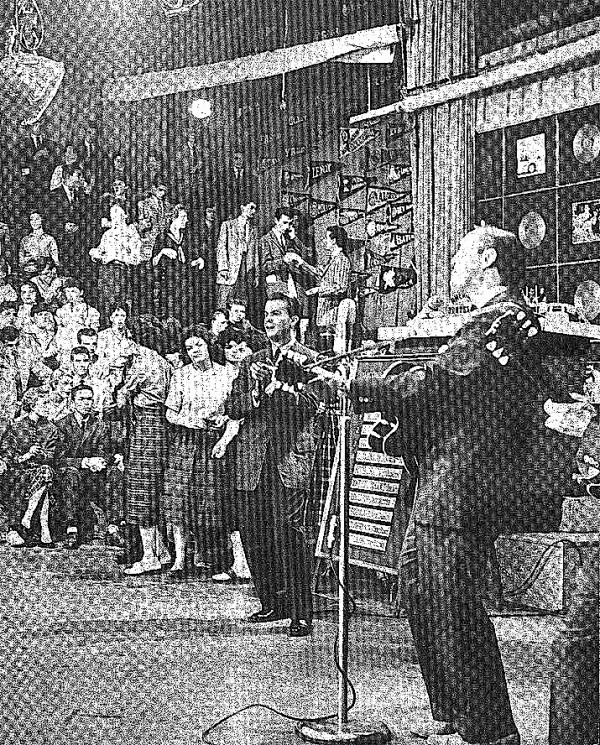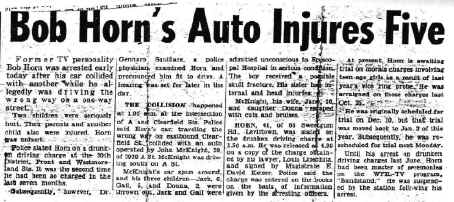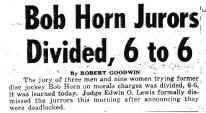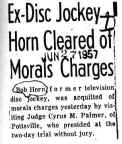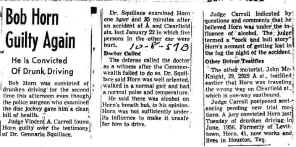Let us just say up front, we have no idea where the truth lies in all of this and merely offer this up for your consideration. In the last 10 years, a very different story about the rise of Bandstand has emerged that runs counter to the soft-focus squeaky-clean nostalgia we’ve all come to know and accept about the beginnings of the Philly-based Mecca of Sock-Hopdom.
It is the story of a man named Bob Horn, a middle-aged hipster DJ, who hosted a show with a simple but then-unheard-of concept: Play rock n’ 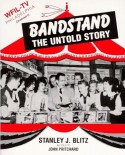 roll records for teenagers dancing on camera. The show was called American Bandstand, of course, and in those early Bob Horn days, it was remembered as spicy cauldron of ethnicity (lotsa greasy South Philly doo-wop; white teenagers dancing to music by “colored” artists) and hormones, ducks’ asses and bobby sox. After four years of hosting Bandstand, Bob Horn was brought up on drunk driving and morals charges (statutory rape) — and though eventually cleared of the latter by two separate juries, this would mark the end of Bob Horn’s career and the rise of the perma-grinning Dick Clark. Or so the official story goes.
roll records for teenagers dancing on camera. The show was called American Bandstand, of course, and in those early Bob Horn days, it was remembered as spicy cauldron of ethnicity (lotsa greasy South Philly doo-wop; white teenagers dancing to music by “colored” artists) and hormones, ducks’ asses and bobby sox. After four years of hosting Bandstand, Bob Horn was brought up on drunk driving and morals charges (statutory rape) — and though eventually cleared of the latter by two separate juries, this would mark the end of Bob Horn’s career and the rise of the perma-grinning Dick Clark. Or so the official story goes.
In White Bicycles, the recently-published memoir by legendary producer Joe Boyd, Horn’s demise is attributed to the fact that Leonore Annenberg — whose husband then owned both the Inquirer and WFIL, which owned and broadcast Bandstand — did not like the music Horn spun on the show. And as a result, an insidious plan was hatched to frame Horn and run him out of town, opening the door to the clean-cut Dick Clark who was already waiting in the wings. Boyd grew up in nearby Princeton, a daily Bandstand watcher as a teen, he clearly remembers the day Bob Horn was replaced with Dick Clark and read all about Horn’s disgrace in the Inquirer. But years later, he came across a book called Bandstand: The Untold Story by Stanley Blitz that offered a much different explanation, as he explains in this excerpt from White Bicycles:
The rape and drunk driving charges were a set-up. WFIL-TV was part of the media empire of Walter Annenberg, later Nixon’s ambassador to London, and Mrs. Annenberg evidently hated the music Horn played. The deeply religious station manager was also revolted by Horn’s hipster ways. By the time he was found not guilty of molesting the girl Horn was a forgotten man in Philadelphia, although not by the many Bandstand ‘regulars’ who wrote Blitz of how much they loved him and how the show lost its soul with Clark. My brother and I were appalled by Dick Clark from his first day on the air. Before long, prefab rockers like Fabian and Frankie Avalon edged out the doo-wop groups. In a year or two, the rock n’ roll era was over, replaced by chirpy corporate pop.
From here, we turn it over to the Bob Horn entry at History-Of-Rock.Com with extensive quotes from Horn’s son, and again, we cannot vouch for the validity of any of this, but if nothing else, it’s a fascinating read:
Bob Horn and Lois Gardner had known each other for two years. Gardner a tiny brunette, who looked older than her years, claimed to have been a member of Paul Whiteman’s Teen Club before becoming a regular visitor to WFIL-TV’s studio in 1952. She would allege that only one week after meeting Horn in the summer of 1953 they drove to his apartment where they engaged in a “discussion”. In November she said that she and Horn, a married man with three young daughters and an adolescent son, began having sexual relations -when she was still thirteen – after which these encounters occurred once or twice a week until the end of 1955.
Horn told a different story claiming he had noticed Gardner at WFIL’s studio, but didn’t speak with her until sometime in 1954 when she appeared at his office, introduced herself and asked to appear on Bandstand. Horn told her that her request wasn’t possible. Horn then went on describe her as what would today be call a groupie and denied ever having sex with her.
In 1956 Philadelphia District Attorney commenced an undercover investigation into a suspected vice ring that it was believed preyed on teenage girls. The ring used promises of modeling careers to lure them into pornographic photo sessions and orgies at Hound Dog Hill, a country estate north of Philadelphia. Lois Gardner was suspected of being involved with the ring.
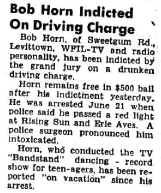
During the early hours of June 21, 1956 Horn was pulled over by police after running a red light. He’s was taken to the local police station where he found to be drunk and was given a ticket for running a red light and arrested for drunken driving. With the Philadelphia Police Department carrying on a month long campaign against drunk drivers, which Annenberg’s Philadelphia Inquirer had championed, WFIL suspended Horn from Bandstand and named Tony Mammerella, the show’s producer, temporary host.
During this time Horn went on an extended vacation after which he was subsequently offered and turned down the position of Music Director. On November 8, 1956 Horn was indicted on four four statutory rape charges and four charging corruption of the morals of a minor.The first trial ended in a hung jury.The family found the whole issue to be quite strange since there was an attempt at extortion. For a considerable amount of money the plaintiff would drop the charges. The prosecution knew of the attempt. The money was actually prepared and a delivery attempted yet the trial continued. The second trial ended with a not guilty verdict.
“I arrived home on Friday night to find the house packed with lawyers and some rather rough looking people. On the kitchen table was a pile of money, the most I’d ever seen in my life. My Dad had been contacted by the girls representstives who said that a $5000.00 payoff would get her out of town. As I remember, Jerry Blavit was asked to deliver the money, or she requested that he do so. It was felt by all that this was complete vindication for my Dad. The attempt was made and witnessed by the prosecution and why all charges were not dropped and why she wasn’t charged I have no idea” …… Peter Horn October14, 2003
Also, on the day of his indictment, Horn was involved in an accident. It seems that Horn was driving the wrong way down a one way street when he hit another car in which a little girl in the other car was seriously injured. Horn was arrested and cited as being drunk. He was taken to the police station where a police surgeon on duty tested him, Horn by his own admission had had two beers) and found him to be intoxicated, but not enough to prevent him from driving safely. Found to be guilty Horn’s insurance company paid $100,000 in claims to the family and owner’s of two parked cars that were damaged as a result of the family’s car being pushed into them.
|
|
|
|
|
These three incidents effectively ended Horn’s career in Philadelphi. A tired and broken Horn left his beloved Philadelphia in July 1957 moving to to Houston, Texas where he took a job with radio station KILT hosting a news-talk-music radio show and he changed his name to Bob Adams.
He died suddenly on July 31st, 1966 of a heart attack while mowing his lawn.

